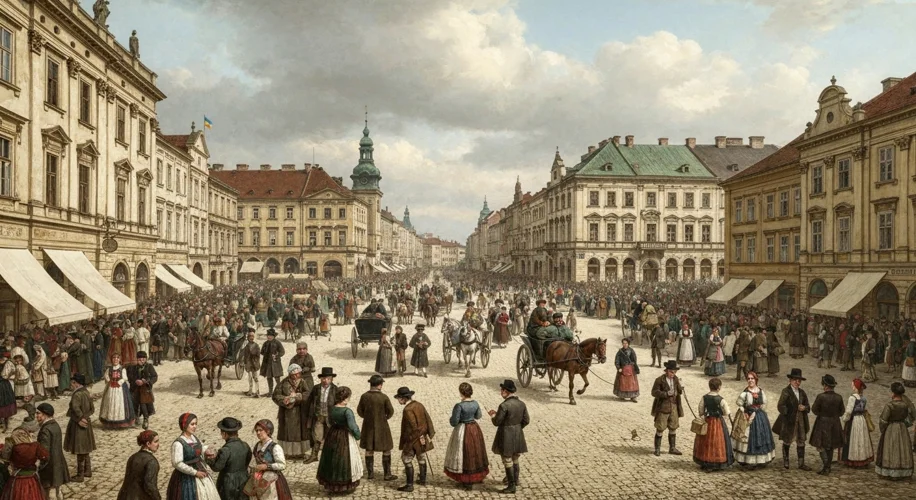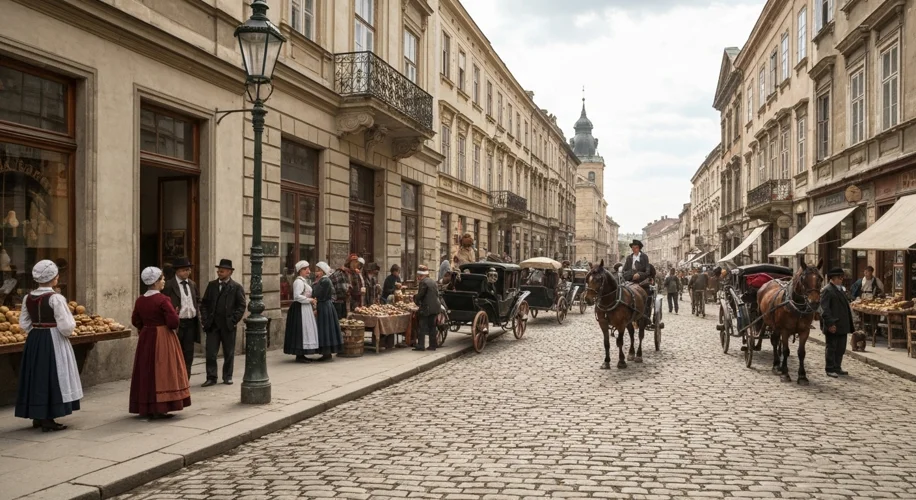The year is 1848. Across Europe, the winds of revolution are blowing, carrying whispers of national identity, liberty, and self-determination. In the heart of the vast Austro-Hungarian Empire, a complex tapestry of peoples and traditions, a particular corner of the world named Galicia was about to become a crucible for one such awakening: that of the Ukrainian nation.
Galicia, a sprawling province that stretched from the Carpathian Mountains to the Vistula River, was a land of ancient plains, fertile soil, and a deeply divided populace. For centuries, its destiny had been intertwined with that of the Polish nobility, who held significant sway over the region. Yet, beneath the surface of this Polish-dominated landscape, a distinct people, the Rusyns, or Ukrainians as they increasingly came to be known, nurtured their own language, faith, and cultural heritage. Their world was one of rural simplicity, deeply connected to the land and the Greek Catholic Church, which served as a vital anchor for their identity.

When the Habsburg monarchy acquired Galicia in 1772 as a result of the First Partition of Poland, it inherited a region simmering with potential. The Empire, a sprawling entity governed from Vienna, was a multi-ethnic state where loyalty to the Emperor often superseded ethnic ties. However, the rise of nationalism in the 19th century presented a unique challenge. The Empire’s strategy, often described as “divide and rule,” sought to balance the competing interests of its diverse populations. In Galicia, this meant navigating the intricate relationship between the dominant Poles and the burgeoning Ukrainian national movement.
Key figures began to emerge from the Ukrainian community, intellectuals and clergy who recognized the need to organize and advocate for their people. Ivan Franko, a towering literary figure and social activist, and Metropolitan Andrey Sheptytsky, the influential head of the Ukrainian Greek Catholic Church, were two such prominent personalities. Franko’s powerful writings championed Ukrainian culture and social justice, while Sheptytsky provided spiritual and institutional support, advocating for greater autonomy and recognition for Ukrainians within the Empire. Their perspectives, though sometimes differing in approach, were united by a common goal: the preservation and advancement of Ukrainian identity.
The Austro-Hungarian administration in Galicia was a complex beast. On one hand, Vienna recognized the value of a distinct Ukrainian presence as a counterweight to Polish influence. This led to certain concessions, such as the establishment of Ukrainian-language schools and the promotion of Ukrainian cultural institutions. The government even supported the development of Ukrainian political parties, allowing them to participate in the Austrian parliament (Reichsrat). The Imperial census of 1890, for instance, recorded a significant Ukrainian population, acknowledging their presence and distinctiveness.
However, this support was often cautious and conditional. The Polish nobility, deeply entrenched in the Galician administration, often resisted efforts to elevate the Ukrainian population. They viewed Ukrainian aspirations with suspicion, fearing a loss of their own political and social dominance. This created a constant tension, a delicate balancing act for the Habsburgs, who sought to maintain order without alienating either significant group. The Ukrainian language, while permitted in some spheres, faced limitations, and opportunities for advancement in the civil service often favored those with Polish connections.
The impact of these policies on Ukrainian national development was profound and multifaceted. Galicia became a vital center for Ukrainian culture and intellectual life, a “Ukrainian Piedmont” as some historians have called it, nurturing a sense of national consciousness that would later fuel the fight for independence. The relative freedoms granted by the Austro-Hungarian Empire, despite its limitations, allowed for the growth of Ukrainian literature, theater, and political organizations. The Greek Catholic Church, under Sheptytsky’s leadership, played a crucial role in preserving Ukrainian traditions and fostering a sense of collective identity.
Yet, the inherent tensions within the system also sowed seeds of future conflict. The frustration with Polish dominance and the perceived slowness of imperial reforms fueled a more radical nationalist sentiment among some Ukrainians. The economic conditions in Galicia, often marked by poverty and land inequality, further exacerbated these tensions. The outbreak of World War I in 1914 would ultimately shatter the fragile peace of the Austro-Hungarian Empire and irrevocably alter the destiny of Galicia and its Ukrainian inhabitants.
The Austro-Hungarian experiment in governing Galicia offers a compelling case study in the complexities of managing multi-ethnic empires in an era of rising nationalism. While Vienna’s policies were not always benign or consistent, they inadvertently provided a fertile ground for the growth of Ukrainian national consciousness. The region, caught between Polish aspirations and Imperial ambitions, became a crucial incubator for a national identity that, though tested by war and political upheaval, would ultimately endure.

